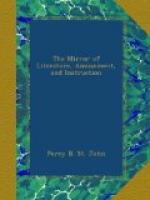The Arkwrights.
Cromford is an immense establishment; but being inferior in magnitude to Belper, and of the same description, I forbear to enlarge upon it. Here the late Sir Richard Arkwright established the first cotton-spinning mill, and from the poverty of a barber’s apprentice, became one of the wealthiest merchants in the united kingdom. The concern is now carried on by his son, and I found that his work-people were in the same state of comfort, as those of the Messrs. Strutt.
The present Mr. Arkwright, son of Sir Richard, is between seventy and eighty, and by the power of unparalleled capital and habits of frugality, he is considered the most wealthy person in Europe. I heard his accumulations estimated at six, eight, and even ten millions; and he spends but 2 or L3,000. per annum. He has eight children, and provides liberally for them, and I heard some anecdotes of his munificence to the deserving, but do not consider myself at liberty to repeat them. His habits lead him to continue in business, though the profits are now trifling. Those of his father and his own, formerly, were 2 or 300 per cent, but competition has now rendered them nearly nominal.
A Village Funeral.
At Ashford, my sympathy was strongly excited by the procession of a village funeral, in which the affections of the people seemed concerned. I found on inquiry, that the corpse was the wife of the schoolmaster, who, in her prime, and in the enjoyment of general esteem, had been cut off in childbirth. The clergyman headed the procession. The coffin was borne by eight females, in white hoods and scarfs, and was followed by the unhappy husband, who conferred great effect, in the display of his grief, by carrying in his arms two young children, the offspring of the deceased. A long train of mourners followed, and I question whether more tears are shed, or more sensibility exhausted, at funerals accompanied with heraldic pomp, than in this simple display of natural affection. I drew up my horse as the procession passed, and the affair threw a gloom over my spirits, in which it seemed as though the village at large partook. The funeral group, with the father and his children, and the sorrowful countenances of the well disposed population, would have made a beautiful subject for a sentimental painter.
Leicester, Derby, and Nottingham.
The present population of these triangular midland towns, are, Leicester, 35,000; Derby, 22,000; and Nottingham, 50,000, in round numbers, and this adds sufficiently to the last population returns. The proportional comfort in each, respectively is 8, 10, and 5—the good taste, 6, 7, and 4—the manners, 5, 8, and 4—the wealth, 4, 6, and 5—the style of the towns, 4, 8, and 2—the industry, 6, 5, and 8—the political spirit, 4, 3, and 10—the religious fervour, 5, 4, and 10—the returns in trade, 5, 6, and 10—the superfices, 6, 4, and 6—the poverty, 6, 2, and 10—the literature, 4, 5, and 4—the musical taste, 5, 3, and 2. Of course, in assigning these numbers, I may err in a fraction; but I make my determinations on my own observations and personal impressions, after diligently observing each place.




